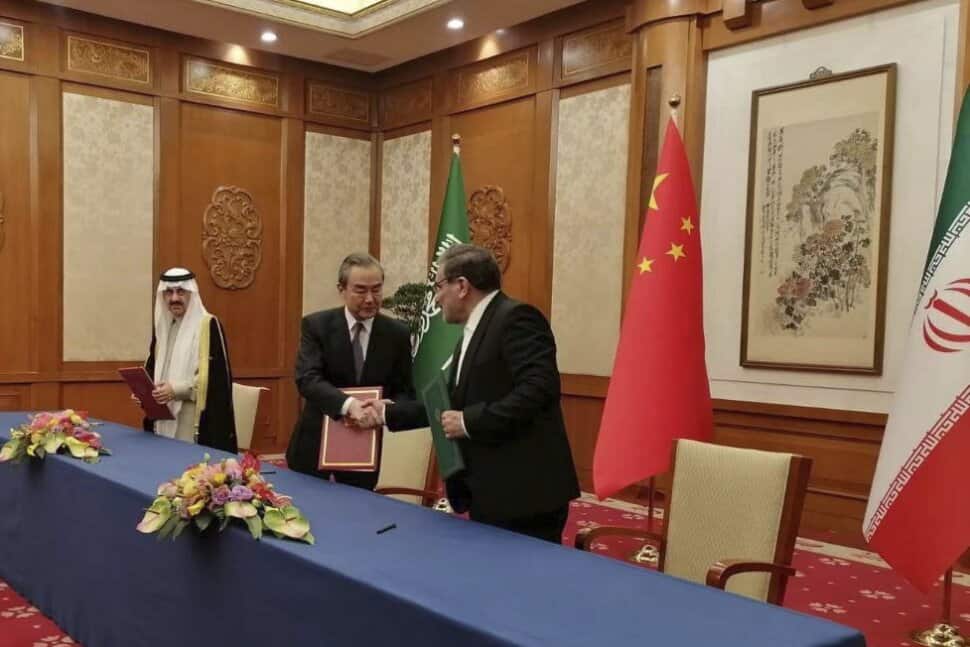Beijing has successfully undermined the U.S. with the surprise news that serves as the greatest evidence yet China is pursuing a more prolific, benign image in global diplomacy.
Saudi Arabia and Iran announced Friday that the regional powerhouses have eased their arch-rivalry enough to restore diplomatic ties, thanks to an agreement brokered by China – a surprising move broadly seen as bolstering Beijing’s ability to project soft power globally at America’s expense.
Several Western analysts expressed surprise at news of the restoration of diplomatic relations as detailed in a statement from China, Iran and Saudi Arabia, following previously undisclosed talks in Beijing. It will take effect by reopening their respective embassies within two months, along with new talks about potential economic and security exchanges.
“The agreement includes their affirmation of the respect for the sovereignty of states and the non-interference in internal affairs,” according to the statement.
Riyadh and Tehran cut ties in 2016 after protesters in Iran stormed the Saudi embassy, which served as only one source of animosity in a regional tension that had been building for years, if not decades. The monarchy in predominantly Sunni Saudi Arabia and the revolutionary leaders in Shiite Iran – the two sects of Islam that have defined much of the conflict in the region – engage in regular disputes and dramatic, at-times deadly, proxy conflicts that have increased since the formal split.
Pro-Iranian rebels in Yemen, notably, have launched barrages of air strikes into neighboring Saudi Arabia in recent years to devastating effect – one in 2019 knocked out half of Saudi Arabia’s oil production.
The new easing of tensions is widely seen as an economic boon for the two regional powers and for China which, unlike the U.S., relies heavily on them for oil exports. It will also have knock-on effects for their respective interests, to include the Israeli-Palestinian conflict as well as the question of whether Iran’s pursuit of nuclear weapons will upset whatever security balance exists in their neighborhood.
“The Saudi-Iranian agreement to normalize relations is good news for the Middle East since Saudi-Iranian tensions have been a driver of instability in the region,” said Trita Parsi, executive vice president of the Quincy Institute for Responsible Statecraft. “Reduced tensions between Riyadh and Tehran can have positive repercussions in Lebanon, Syria, Iraq, and perhaps most importantly, Yemen.”
“Saudi-Iranian tensions have had many ups and downs in the past 40 years, but this is the first time they have agreed to lower the temperature through Chinese mediation. By not taking sides in the Saudi-Iranian conflict, China has emerged as a player that can resolve disputes rather than merely sell weapons to the conflicting parties,” Parsi added.
Other analysts note that the U.S. boxed in itself diplomatically with regard to new overtures for either country. The Trump administration championed support for Saudi Arabia and defined much of its foreign policy as adversarial to Iran and took unprecedented measures to punish it, often unilaterally. The Biden administration, subsequently, has directed unprecedented criticisms at the reign of Saudi Crown Prince Mohammed bin Salman. And it has stated it sees little chances of restoring the 2015 agreement governing Iran’s nuclear program – the sole source of diplomatic engagement since the two countries do not have formal relations – and has deprioritized engagement with Tehran.
Jon Alterman with the Center for Strategic and International Studies notes that the U.S. could not have matched the diplomatic overture China announced Friday chiefly because it does not have direct contact with Iran.
“The Biden administration has spoken about the importance of regional security dialogues and is presumably supportive of this agreement, at least in general terms,” Alterman wrote in an analysis note published shortly after news of the agreement broke. “But the fact that Saudi Arabia struck the agreement in a way that seems to have entirely excluded the United States sends a message that the Saudis are seeking to diversify their bets on security and not rely wholly on the United States.”

